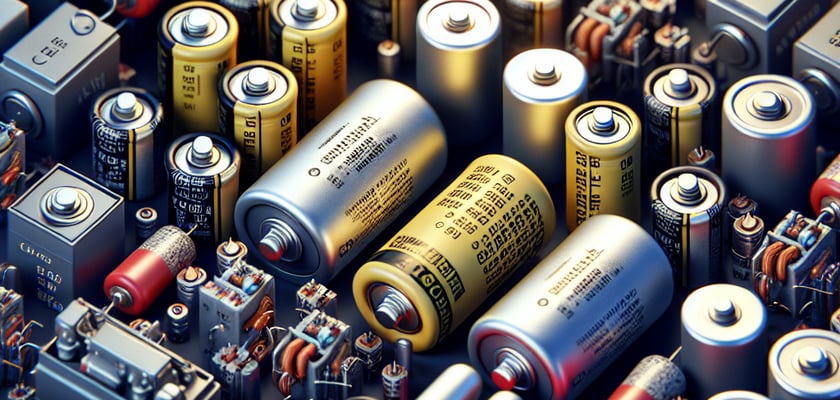Ladies, gentlemen, and tech aficionados, gather ’round as we explore the electrifying world of energy storage devices, where capacitors and batteries duke it out for supremacy in the power-stashing arena. Now, imagine a capacitor as that friend who chugs an energy drink—the one who gets hyped up instantly for a power-packed sprint but then, just as quickly, needs to crash on your couch. That’s a capacitor for you; it charges faster than a caffeine kick and discharges like a startled squirrel, yet it can’t hold its charge for long. Then there’s the battery, the tortoise to the capacitor’s hare. It takes its sweet time to charge and might miss a few express trains while doing so but will keep chugging along, powering devices long after the capacitor’s zippy spark has fizzed out. They’re the marathon runners of the energy world, storing energy like a packrat hoarding nuts for the winter.
Now buckle up, my curious friends, because we’re about to embark on a fantastical voyage through the labyrinth of electron avenues and chemical party tricks. Next up, we’ll uncover the key takeaways of this high-voltage tale, including the nitty-gritty of lifespans, power densities, and why your smartphone still craves its battery over a capacitor. So don’t wander off to the land of lost socks or get entangled in cat videos just yet; there’s more electrifying wit and wisdom coming your way, full of sparks and “aha!” moments that’ll stick to your grey cells like bubblegum under a school desk!
Key points I covered in this post
1. Capacitors and batteries serve as energy storage devices, but they function through different mechanisms. A capacitor stores energy in the form of an electric field created between two plates when a voltage is applied, whereas a battery stores energy through chemical reactions that result in a build-up of electrons at the anode, which then flow to the cathode.
2. The rate at which energy is released differs significantly between the two devices. Capacitors can discharge their energy much more rapidly than batteries because there is no chemical reaction to limit the rate of electron flow. This makes capacitors ideal for applications requiring quick bursts of power, while batteries are better suited for long-term, steady power output.
3. When it comes to lifespan, capacitors generally outperform batteries. Capacitors can endure many more charge and discharge cycles than batteries without a significant decrease in performance. Batteries, on the other hand, will typically start losing their capacity after a few hundred to a few thousand cycles because of chemical degradation.
4. Energy density is another area where capacitors and batteries differ. Batteries have a much higher energy density, meaning they can store more energy than a capacitor of the same size. This is why batteries are commonly used for applications like mobile phones and electric vehicles, where storing a large amount of energy in a small space is critical.
5. Capacitors charge and discharge almost instantly compared to batteries, which typically require a much longer time to charge and may discharge over a period of hours. The instant charge and discharge feature of capacitors make them particularly useful in applications like power conditioning, motor starters, and camera flashes, where fast energy release is essential.
What Is the Fundamental Difference Between a Capacitor and a Battery?
Capacitors and batteries are both energy storage devices, but they function in distinctly different ways. A capacitor stores energy in the form of an electric field between its plates, allowing it to charge and discharge rapidly. Batteries, on the other hand, rely on chemical reactions to store and release energy which enables them to provide a steady flow of power over a longer period.
Energy Storage Mechanism
Batteries store energy through chemical reactions within cells that contain a cathode, an anode, and an electrolyte. These reactions create a flow of electrons, which is harnessed as electrical energy. Over time, the reactive materials are consumed, which causes battery capacity to diminish. In contrast, capacitors store energy electrostatically, with no chemical change occurring in the materials. This allows a capacitor to charge and discharge much faster than a battery and gives capacitors a much longer lifespan in terms of cycles.
Charge and Discharge Rates
Capacitors can charge and discharge almost instantaneously, offering high power density but relatively low energy density. This makes them ideal for applications requiring rapid bursts of energy, such as in camera flashes or to smooth out brief power dips. On the other hand, batteries can offer a lower power density but high energy density, meaning they can store more total energy and deliver it at a lower rate over a more extended time. Therefore, batteries are better suited for applications like powering electric vehicles or electronic devices over hours.
Capacitance and Battery Capacity
The capability of a capacitor is defined by its capacitance, measured in farads, which indicates how much electric charge it can store at a given voltage. Meanwhile, battery capacity is typically measured in ampere-hours (Ah), reflecting the amount of current a battery can provide over a certain period. Battery capacity provides a more realistic indication of how long a device will operate on a single charge, whereas a capacitor’s capacitance will reveal how quickly it can release its charge.
Lifespan and Durability
Capacitors are known for their exceptional cycle life, often capable of millions of charge and discharge cycles without significant degradation. This makes them particularly valuable in systems requiring frequent power cycling. Conversely, batteries have a more limited cycle life, generally up to a few thousand cycles, and are susceptible to wear from frequent charging and discharging, as well as from harsh environmental conditions. Furthermore, capacitors are generally more resistant to temperature extremes than batteries, which can suffer from reduced performance in cold or hot conditions.
Physical Size and Form Factor
The size and shape of capacitors and batteries vary widely, dictated largely by their intended application. Capacitors are generally smaller and can be made in a variety of shapes to fit into tight spaces on electronic boards. Batteries, due to their higher energy density, are usually larger and heavier for a given energy requirement, although advancements in battery technology have led to smaller and lighter designs for portable electronics.
Applications and Uses
The applications for capacitors and batteries often overlap, but each has its distinctive advantages that make it more suitable for certain tasks. Batteries are the go-to choice for long-term, low-draw energy supply, as seen in laptops and smartphones. Capacitors, however, excel in stabilizing power supplies and providing high-power pulses, making them integral in power conditioning, signal processing applications, and in motor starters.
Cost Implications
The cost of capacitors and batteries can vary significantly based on the specific types (like lithium-ion batteries versus supercapacitors) and their capacities. Generally, capacitors are cheaper for the same voltage, but since they store less energy, a battery might be more cost-effective for energy-intensive applications. Operational lifespan and maintenance costs also play into the total cost of ownership, with capacitors often being more economical due to their longer lifespan and minimal maintenance.
Environmental Considerations
Environmental impact is another point of differentiation. Batteries, especially those that are not recyclable or contain hazardous materials, can be detrimental to the environment when not disposed of properly. Capacitors tend to have less environmental impact due to their longer life cycle and absence of toxic chemicals. The choice between capacitors and batteries may be influenced by regulatory frameworks and sustainability goals of organizations and industries.
What Are Some User Tips for Deciding Between a Capacitor and a Battery?
- Analyze the power and energy requirements of your application; use a capacitor for high power, short-term needs and a battery for sustained, long-term energy delivery.
- Consider the longevity and cycle life requirements of your application; if frequent cycling is needed, capacitors may be more economical in the long run.
- Take into account the form factor and physical space constraints; capacitors can be more flexible in size and shape than batteries.
- Evaluate the total cost of ownership, not just the upfront costs; factor in lifespan, maintenance, and disposal costs.
- Assess environmental impact and disposal concerns; capacitors generally offer a greener option.
- Stay informed on the latest advancements in technology, as innovations in both capacitors and batteries may influence their suitability for future applications.
How Do Capacitors and Batteries Store Energy Differently?
Capacitors store energy electrostatically in an electric field between plates, allowing them to charge and discharge rapidly. In contrast, batteries store energy chemically within their cells, resulting in slower charge and discharge rates but enabling them to hold their charge for much longer periods.
Can Capacitors Provide Power for as Long as Batteries?
No, capacitors typically provide power for a much shorter duration than batteries. While capacitors can release their energy almost instantaneously, ttheir storage capacity is usually much lower than that of a battery, which can deliver power steadily over a longer time.
Are Capacitors or Batteries Better for High-Power Applications?
Capacitors are usually better for high-power applications that require a quick discharge of energy, such as in camera flashes or for power conditioning. Batteries, on the other hand, are better suited for applications requiring sustained power over a longer period, like powering electronic devices.
What Makes Capacitors Ideal for Use in Electronic Circuits Over Batteries?
Capacitors are ideal for electronic circuits because of their ability to charge and discharge rapidly, providing bursts of energy as needed and stabilizing voltage within the circuit. They are also good for “smoothing” the output of power supplies by filtering out voltage spikes and drops.
Is There a Risk of Explosion with Capacitors Like There Can Be with Batteries?
While capacitors are generally considered safe, they can still fail and potentially explode if subjected to voltage exceeding their rating, short circuit, or if incorrectly installed. However, such incidents are less common compared to batteries, which can have a higher risk of explosion or leakage due to chemical instability, especially in lithium-ion batteries if they are overcharged, damaged, or improperly handled.
Final Thoughts
The discussion of capacitors versus batteries reveals significant differences in their storage mechanisms, discharge rates, and typical applications. As we step further into an electrified future, understanding these distinctions becomes increasingly essential. Capacitors, with their rapid charge and discharge capabilities, play a critical role in many modern electronics and power management systems, while batteries, with their higher energy densities and longer discharge durations, are central to portable energy and the support of renewable energy integration. Both technologies are evolving, and advancements could further blur the lines of their applications or lead to new energy storage solutions altogether.
Ultimately, the choice between using a capacitor or a battery depends greatly on the specific needs of the application: whether the priority is on quick bursts of power or prolonged energy provision. Engineers and designers will continue to weigh the pros and cons of each to harness their unique properties, often opting to use them in complementary roles within systems. The continued innovation in both fields promises to enhance their efficiency, capacity, and safety, contributing to a more resilient and flexible energy landscape.

